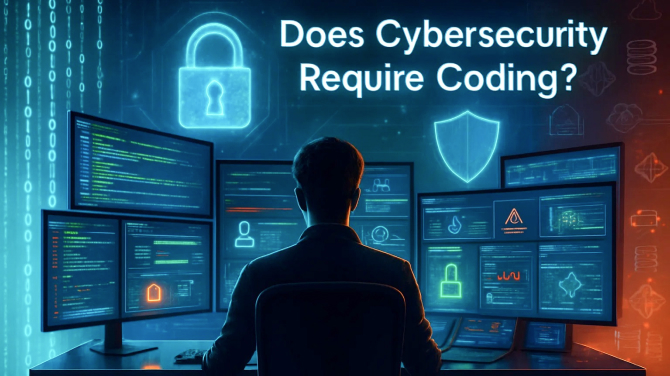Overview
Cybersecurity is about keeping your computer system, network, and sensitive data safe from unauthorized access. In today’s fast-paced world, cyberattacks are becoming more common and advanced across a wide range of industries. This significant advancement increases the need for people's awareness about detection and prevention techniques of cybersecurity. However, the global cybersecurity market is expected to see 7.58% annual growth between 2025 to 2029 and crossing $1.90 billion by 2029.
Nevertheless, training to become a programmer or coder can lead to further development. Numerous high-level cybersecurity roles (such as CISOs) have the need for senior programming expertise along with information technology skillsets.
Most importantly, cybersecurity work does not have to involve remaining in the technical field - industries such as finance, healthcare, education, and government need data security and protection. Cybersecurity Require Coding? Yes and no — it depends on the role, as explored below.
Understanding Cyber Security
Cyber security is keeping computers, phones, and other devices from being hacked and attacked by malicious software. We lock our houses to prevent burglars from entering, and cyber security prevents thieves from getting into our details online, such as passwords and bank accounts. It involves having good passwords, antivirus software, and watching what we click on. Being safe online in today's computer age is as important as being safe in the real world.
Jobs That Typically Require Knowledge of Coding
Ethical hackers and penetration testers
These experts usually have to code specific exploits, automate testing processes, and comprehend the way applications operate at the code level. Python, JavaScript, and scripting languages are typical choices.
Software Developers
These individuals develop security tools, firewalls, and protection systems. They need the same programming expertise as standard software developers, along with security-specific knowledge.
DevSecOps Engineers
These positions encompass development and security, and to add security to the development cycle, one needs scripting language knowledge, automation tool knowledge, and CI/CD pipeline knowledge.
Security Researchers
Security researchers examining malware, finding vulnerabilities, or creating new security tools must be well-versed in programming. They tend to work with assembly language, C/C++, and reverse engineering tools.
In all these roles, the answer is clearly yes, cybersecurity require coding — often to a high level.
Roles Where Coding is Less Important
Most analyst roles are concerned with tracking security events, looking into incidents, and reacting to threats with tools that are already available. Scripting knowledge is helpful but not necessarily important.
Security consultants tend to concentrate on risk assessment, policy creation, and long-term security planning. Technical knowledge is relevant, but deep coding knowledge is not indispensable. For example, professionals working with SASE solution providers often focus on network security architecture, vendor evaluation, and policy enforcement strategies rather than hands-on programming.
Compliance officer's jobs are focused on ensuring that organizations comply with regulatory standards and security policies. They demand knowledge of security architectures instead of programming languages.
Security Managers and Directors Leadership roles tend to focus more on strategic planning, managing teams, and business skills than on coding expertise.
In such paths, Cybersecurity require coding only to a limited or optional degree.
The Advantages of Cybersecurity Coding
Even in positions where coding is not necessarily a requirement, coding skills are a major bonus:
- Security professionals have to work on repetitive processes that can be automated. Log analysis, vulnerability scanning, and incident response – scripting can save hours and minimize human error.
- Once you understand how applications are built, you have a clearer picture of how they can be attacked. This knowledge is invaluable in finding weaknesses and building effective countermeasures.
- Off-the-shelf security gear does not necessarily fit specific needs. Knowing how to code allows you to modify existing gear or create new solutions to address unique problems.
- Cybersecurity depends more and more on technicality, and thus professionals with coding skills have better career prospects and higher earning potential.
Critical Programming Languages for Cybersecurity
Python
The most common choice for cybersecurity experts, Python is easy to start with, has huge libraries for security operations, and is most often used for automation, data analysis, and tool building.
JavaScript
Critical to web application security, JavaScript familiarity enables comprehension of client-side weaknesses and contemporary web attack surfaces.
PowerShell and Bash
These scripting languages are of vital importance to system administration and automation within Windows and Unix environments, respectively.
SQL
Secure database systems need knowledge of SQL to detect SQL injection vulnerabilities and protect database systems.
C/C++
Essential for malware analysis, developing exploits, and learning about low-level system security.
How You Can Start Without Coding Experience
If you are new to cybersecurity and have no coding background, do not be discouraged. Most individuals ask is cyber security hard when looking into this career option, but if you approach it correctly, it's well within reach:
- First, learn basic security concepts, networking, and operating systems prior to learning about programming.
- Determine what area of cybersecurity appeals to you the most, then find out the coding demands of that particular field.
- Begin with Python or PowerShell scripting languages that will directly enhance your productivity and then proceed to other languages whenever necessary.
- Use coding abilities in actual security issues. Create basic automation scripts, review log files, or work on open-source security projects.
The Future of Cybersecurity and Coding
The future of cybersecurity and coding is being revolutionized by artificial intelligence, which can detect threats instantly and help developers write better code faster. Quantum computing will break current encryption but also create new security methods. Zero-trust architecture means constantly verifying identity rather than trusting once.
Everything from cars to refrigerators getting connected creates new security challenges. Blockchain provides tamper-proof records, while biometric security becomes more sophisticated. Security will become invisible and seamless, protecting us automatically without passwords. The field offers exciting opportunities for creative problem-solvers who can adapt to rapidly evolving digital threats and protection methods.
Conclusion
Although cybersecurity require coding at some level but it does not required for all cybersecurity careers, it is increasingly worth learning as the industry advances. Most successful cybersecurity experts prosper in analyst, consulting, and management roles without extreme programming skills. Nevertheless, individuals who take the time to learn languages such as Python, JavaScript, and scripting tools tend to have superior career prospects and salaries. The secret is knowing that cybersecurity presents varied avenues - from technical positions demanding heavy coding to strategic roles emphasizing policy and risk management. Whether you're a coding master or complete novice, there's a spot for you in the expanding world of cybersecurity opportunities.







